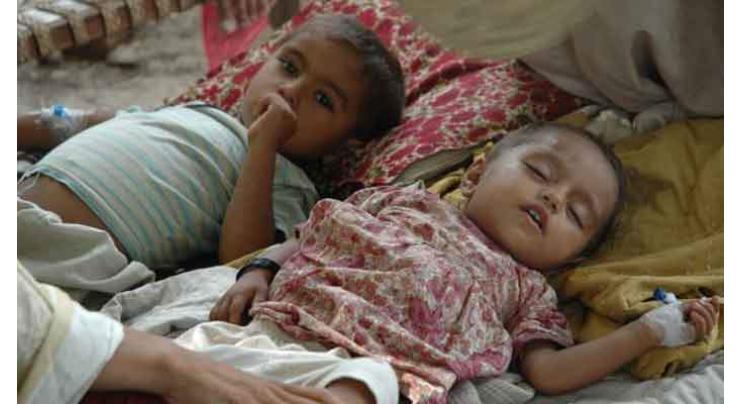
- Home
- Pakistan
- News
- 177mn people are at high risk of malaria in Pakistan, prevalence rate in KP higher than other provin ..
177mn People Are At High Risk Of Malaria In Pakistan, Prevalence Rate In KP Higher Than Other Provinces: Study
Mohammad Ali (@ChaudhryMAli88) Published April 26, 2019 | 05:50 PM

Pakistan has a population of 220 million inhabitants of which 177 million were at risk of malaria with 3.5 million presumed and confirmed malaria cases annually
PESHAWAR, (UrduPoint / Pakistan Point News - 26th Apr, 2019 ) :Pakistan has a population of 220 million inhabitants of which 177 million were at risk of malaria with 3.5 million presumed and confirmed malaria cases annually.
According to a study published in Annals of Reviews and Research in September 2018, the prevalence rate of malaria in Khyber Pakhutnkhwa is 13.81%. It is noticed that Khyber Pakhutnkhwa is the most malaria affected province of Pakistan as compared to the other three provinces Punjab (2.4%), Sindh (10.8%) and Baluchistan (3.8%).
KMC observed World Malaria Day to highlight the need for continued investment and sustained political commitment for malaria prevention and control here on Thursday. The theme for World Malaria Day 2019, "Zero malaria starts with me".
The KMC also arranged a walk attended by MBBS students of all years, faculty staff, management staff, TMOs' and HOs. The chief guest of World Malaria Day was Dean KMC Prof Dr Noor-ul-Eman along with Chairman Medicine Prof Dr Muhammad Hamayun and Prof Dr Faiz Ur Rehman.
The Social Welfare Society of Health education Wing KMC arranged poster competition, scavenger hunt, quiz competition, awareness walk and prize distribution to mark the World Malaria Day.
In 2016, malaria caused an estimated 216 million clinical episodes, and 445,000 deaths. An estimated 90% of deaths in 2016 were in the WHO African Region. Nearly half the world's population lives in areas at risk of malaria transmission in 91 countries and territories.
Epidemiologically, Pakistan is classified as a moderate malaria endemic country with a wide diversity within and between the provinces and districts. Malaria in Pakistan is typically unstable and major transmission period is post monsoon i.e. from August to November.
A renowned physician Prof Dr Muhammad Hamayun said that prevention is an important component of malaria control in endemic countries which is achieved through vector control, personal protection measures such as insecticide-treated bed nets, preventive treatment with anti-malarial drugs of vulnerable groups such as pregnant women, who receive intermittent preventive treatment.
Every year Department of Medicine KTH receives a multitude of malaria patients.
A majority of them are referred from the periphery and have been partially treated.
Related Topics
Recent Stories

UHS to issue MBBS degrees within three months after final result

Aiman Khan granted UAE Golden Visa

PSX achieves significant milestone, surpasses 72,000 mark

Pak Vs NZ T20I: Orphaned children extended special invitation to watch match

Finance Minister lauds UNDP’s unwavering support during floods

President Raisi leaves for Iran from Karachi

Currency Rate In Pakistan - Dollar, Euro, Pound, Riyal Rates On 24 April 2024

Today Gold Rate in Pakistan 24 April 2024

Punjab CM inaugurates Pakistan’s first Virtual Women Police Station

Dutch model Donny Roelvink embraces Islam

Experts raise concerns over introduction of 10-stick packs

Iranian president arrives in Karachi
More Stories From Pakistan
-
DC chairs emergency response committee meeting
8 minutes ago -
COMSTECH organizes Certificate Course on Neurology in Kampala, Uganda
8 minutes ago -
Drug dealer held with over 2 kg hashish
8 minutes ago -
Students urged to make earth safe for coming generations
17 minutes ago -
Policemen awarded for best performance
27 minutes ago -
Book 'Physics and Cosmology' exploring science, spirituality conduits launched at IPRI
27 minutes ago
-
Four factory workers injured in boiler explosion died
27 minutes ago -
Law Minister meets IPC delegation
27 minutes ago -
12 'criminals' arrested in Sargodha
27 minutes ago -
Boran DAP inauguration ceremony held
27 minutes ago -
Hyderabad police arrest three criminals
28 minutes ago -
5-member bike-lifter gang busted
37 minutes ago